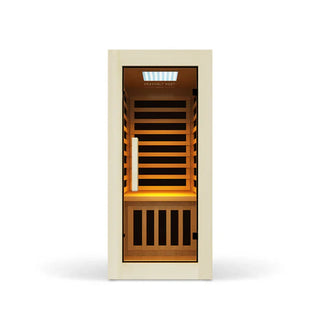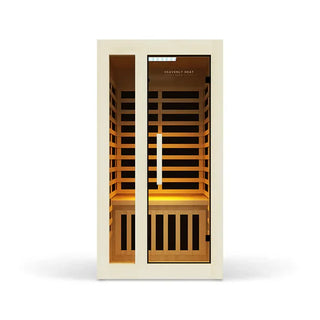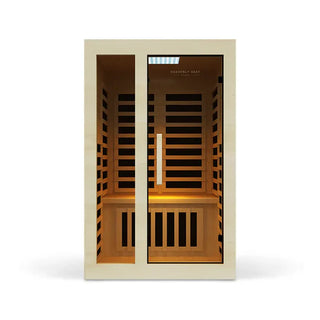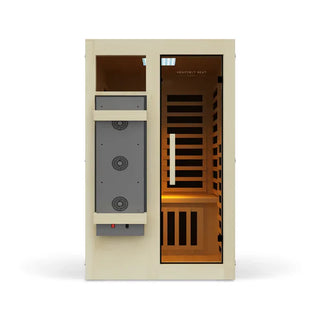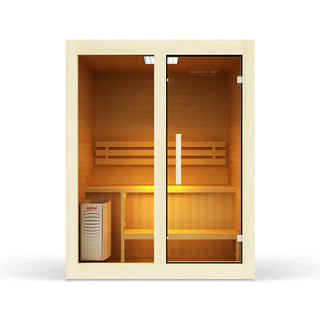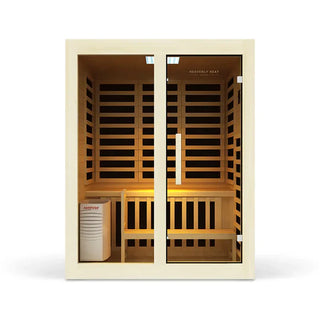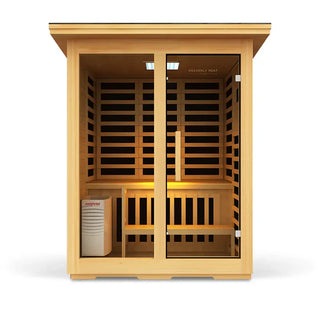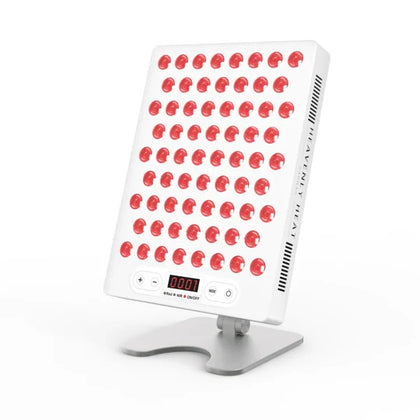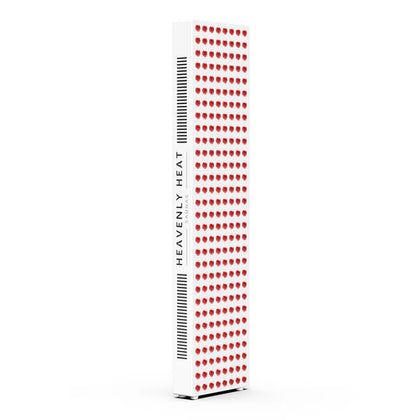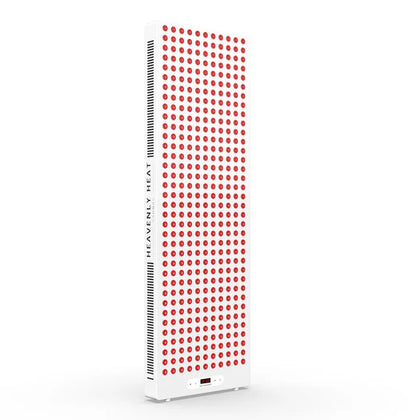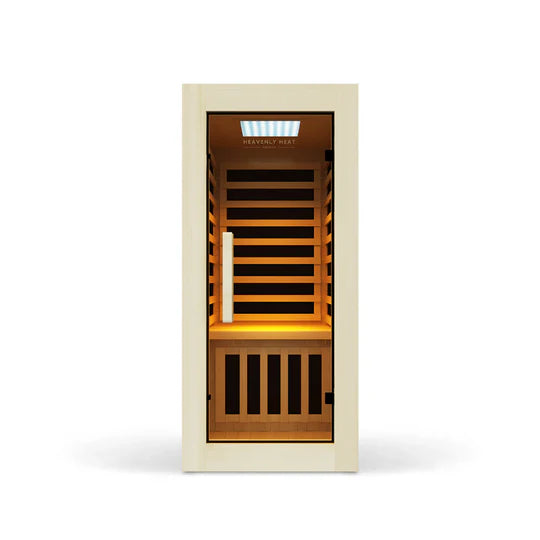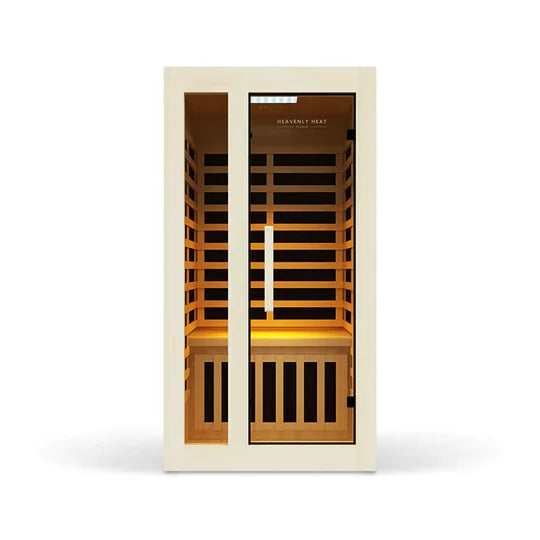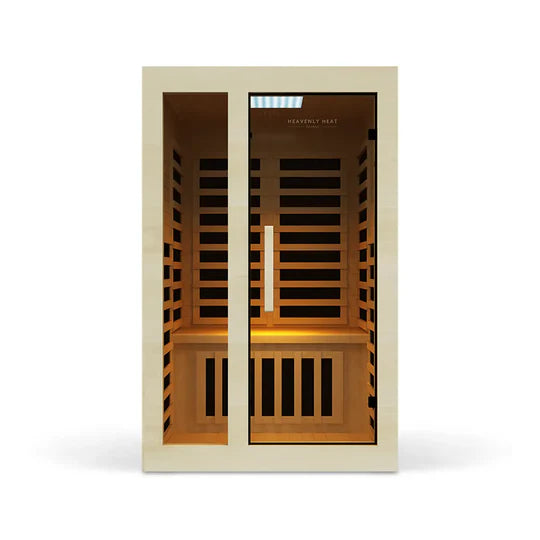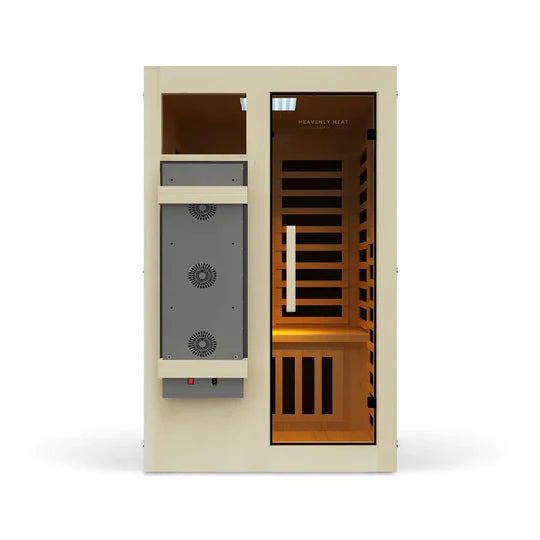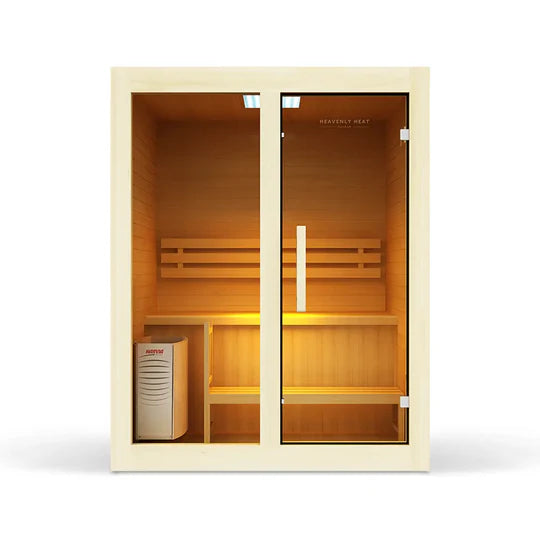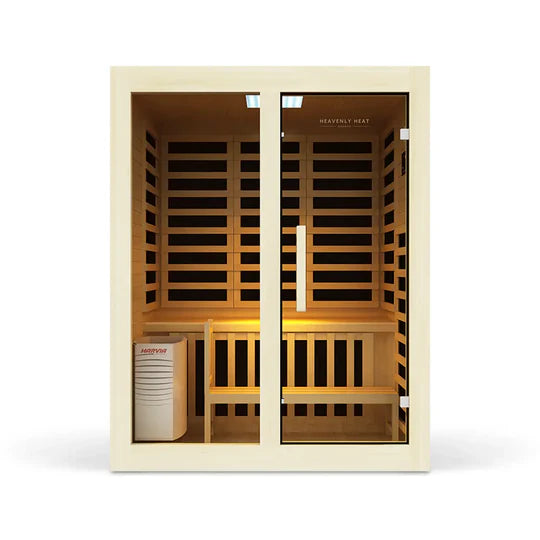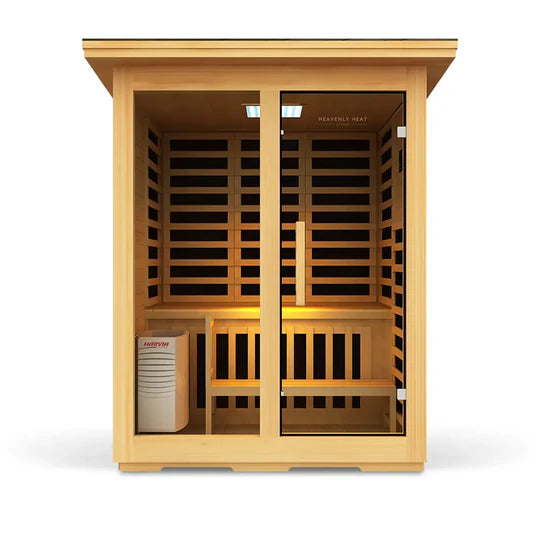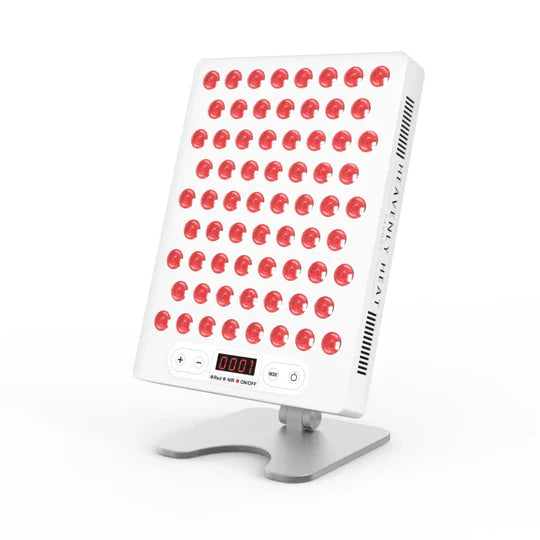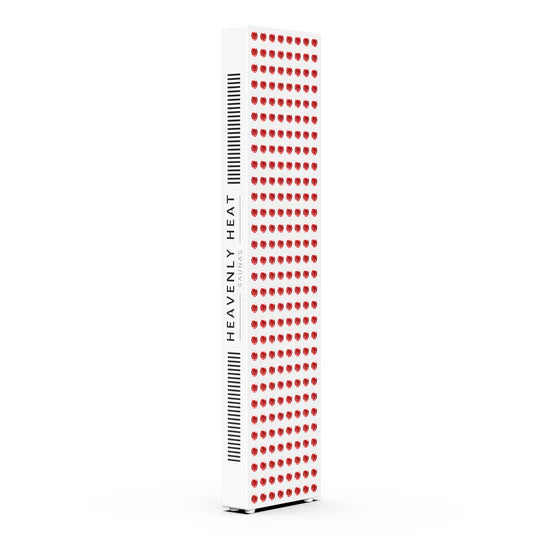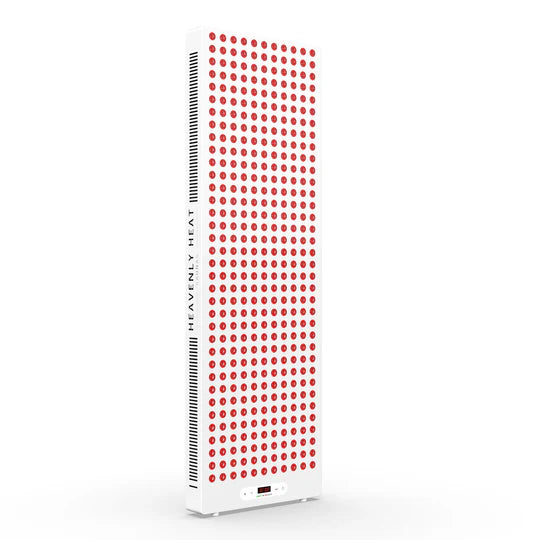Can Saunas Cause Diarrhea? Infrared Detox & Digestion

Saunas are known for their relaxing benefits, but some people experience unexpected digestive issues afterward.
Could the heat, dehydration, or electrolyte shifts play a role? While not everyone is affected, it’s worth exploring how saunas might impact digestion—and what you can do to avoid any unwanted surprises. Let’s take a closer look.
Table of contents
Key Takeaways
-
Saunas Can Affect Digestion: Heat exposure may speed up digestion, leading to diarrhea or discomfort.
-
Dehydration Disrupts Gut Health: Excessive sweating can cause electrolyte imbalances, impacting digestion and bowel movements.
-
Electrolytes Are Essential: Replenishing minerals like sodium and magnesium helps maintain gut function after a sauna.
-
Certain Foods Can Worsen Symptoms: Spicy, high-fat, and dairy-heavy foods may trigger digestive issues post-sauna.
-
Hydration and Moderation Are Key: Drinking water, eating light meals, and limiting sauna time help prevent stomach problems.
The Link Between Sauna Use and Gut Health
- Saunas: Dual Impact on Digestion: Heat can either accelerate or decelerate bowel movements.
- Electrolyte Shifts & Gut Health: Sweating alters hydration, potentially causing temporary gut imbalances.
- Bloating Relief vs. Sensitivity: Many experience reduced bloating, but some may face increased discomfort.
- Individual Body Responses Vary: Sauna effects differ significantly from person to person.
- Personal Awareness is Crucial: Understanding your body's reaction ensures optimal balance.
Can Using a Sauna Cause Diarrhea?
- Sweating too much in a sauna can mess with your stomach: When you're in a sauna, you sweat a lot, and that means your body loses water fast. If you get too dehydrated, your digestion slows down, which can lead to loose or watery stools.
- Losing salts while sweating can upset your gut: Along with water, your body also loses important salts and minerals when you sweat. This throws off your electrolyte balance, which your gut needs to work properly. When things go off balance, diarrhea can happen.
- The heat from the sauna can make food move too fast in your body: High heat doesn’t just make you sweat, it also speeds up how your body digests food. That means food can rush through your intestines without being fully processed, which can lead to diarrhea.
- Detox effects from the sauna can make things worse for some people: Some people use saunas to “detox.” When the body pushes out stored waste and toxins, it can cause stronger reactions, like stomach cramps or diarrhea, especially if your body isn’t used to it.
- Drinking water and eating smart can help avoid these problems: To keep diarrhea away, drink plenty of water, replace lost salts (electrolytes), and don’t go into a sauna with an empty belly or right after a big heavy meal. These small steps can make a big difference.
How Dehydration from a Sauna Impacts Your Stomach?
Reduced Digestive Enzyme Production
Dehydration affects the body’s ability to produce digestive enzymes, making it harder to digest food efficiently.
This can lead to bloating, discomfort, and even constipation. Since stomach acid production is also affected, food may sit longer in the stomach, causing digestive sluggishness.
Replenishing fluids and electrolytes quickly restores balance, helping digestion run smoothly.
Imbalance in Stomach Acid Levels
Dehydration from sauna use can cause stomach acid fluctuations. In some cases, the stomach overproduces acid, increasing the risk of heartburn and acid reflux. In other cases, acid levels drop, slowing digestion and causing bloating. Drinking electrolyte-rich fluids can help restore balance and prevent discomfort.
Slower Digestion and Constipation
Water plays a key role in digestion by keeping stool soft and promoting intestinal movement.
When dehydration occurs, peristalsis slows down, leading to harder stools and constipation.
To avoid this, drink water before and after a sauna session. Including electrolyte-rich drinks or mineral water can help maintain gut health and prevent constipation.
Stomach Cramps and Discomfort
Sauna-induced dehydration can lead to stomach cramps. The intestines struggle to move food efficiently, causing bloating, sharp pains, or general stomach discomfort.
An electrolyte imbalance can also contribute to these cramps. Rehydrating properly and eating a light meal beforehand can prevent discomfort.
Increased Risk of Nausea
- Not drinking water after sweating can quickly make you feel sick: Sweating excessively without drinking enough water can trigger nausea, a surprisingly common reaction to sauna sessions.
- Dehydration slows digestion and upsets your stomach: Dehydration reduces blood flow to the stomach, slowing digestion and leaving you feeling queasy or dizzy.
- Losing key minerals adds to the nauseous feeling: Losing too many electrolytes, like sodium and potassium, only makes it worse, adding to that unsteady, unsettled feeling.
- A study shows sauna dehydration causes more stomach issues: According to a study where researchers explored how dehydration affects the gut, they had ten fit guys use a sauna to lose a chunk of their body weight through sweat before cycling hard.
-
The stomach struggles more when you’re low on fluids: In that dehydrated state, their stomachs took longer to empty compared to when they were well-hydrated, and they felt way more nausea and stomach cramps during the workout.
The slower digestion was strongly tied to that queasy feeling, showing how dehydration can really throw your stomach off balance.
- Pushing your body too far in heat makes nausea worse: It’s a clear sign that pushing your body too far in the heat can backfire.
- Sipping water during and after sauna helps prevent nausea: Drinking small sips of water during and after a sauna session can keep nausea at bay, giving your stomach the support it needs to settle down.
Gut Microbiome Disruptions
The gut relies on proper hydration to maintain a healthy balance of beneficial bacteria.
Dehydration can reduce the number of good bacteria that aid digestion. Some research suggests prolonged dehydration could contribute to gut disorders.
Replenishing fluids quickly, consuming fiber-rich foods, and eating probiotic-rich foods can help restore balance.
Loss of Protective Mucus in the Stomach
Dehydration from sauna use can reduce mucus production, making the stomach lining more vulnerable to acid-related issues.
An electrolyte imbalance further weakens this protective layer, increasing discomfort and inflammation.
Drinking water, consuming electrolyte-rich foods, and avoiding excessively long sauna sessions can help maintain the stomach’s protective barrier.
Why Electrolytes Matter for Digestion After a Sauna?
Restoring Hydration Levels After Sweating
Sweating in a sauna depletes fluids and essential minerals, making rehydration crucial.
Electrolytes like sodium, potassium, and magnesium help retain fluids and prevent imbalances.
Coconut water, sports drinks, and mineral-rich foods restore lost electrolytes.
Replenishing Essential Minerals for Gut Health
Electrolytes support gut function. Magnesium aids muscle contractions in the intestines, while sodium and potassium help nutrient absorption.
Leafy greens, bananas, and nuts are excellent natural sources. Keeping electrolytes in check ensures a strong gut lining, preventing post-sauna digestive distress.
Supporting Enzyme Function for Better Digestion
- Electrolytes give digestive enzymes the strength to work: Electrolytes like magnesium, sodium, and chloride are needed for your digestive enzymes to activate and function properly.
- Without enough electrolytes, your digestion slows down: If these minerals are out of balance, your body can’t produce enough enzymes, which may lead to bloating or stomach discomfort.
- Drinking and eating right helps enzymes do their job: Rehydrating with mineral-rich drinks and foods helps bring electrolytes back into balance and supports proper digestion.
- Losing fluids in a sauna is similar to getting dehydrated from illness: A study on children with diarrhea showed how losing too many fluids can seriously mess up electrolyte levels, just like what happens after a sauna.
- Even small fluid loss can upset your digestion: The research showed that even mild dehydration caused noticeable changes in sodium and potassium, which can lead to problems like metabolic acidosis and poor digestion.
- A lack of minerals weakens your gut’s natural defense: When electrolyte levels drop, your gut lining becomes more vulnerable, which can lead to post-sauna digestive issues.
- Sweating in a sauna takes away minerals your gut needs: You’re not just losing water in the sauna, you’re losing the minerals that keep your digestion working the way it should.
- Putting those minerals back is not optional, it’s necessary: Replacing lost electrolytes after a sauna is not just helpful, it’s necessary to keep your digestion smooth and your gut healthy.

Balancing Stomach Acid for Nutrient Absorption
Electrolytes like sodium and chloride regulate stomach acid production. Rehydration with mineral-rich water or broth helps maintain acidity levels.
Ensuring electrolyte balance post-sauna helps prevent nutrient deficiencies that impact overall gut health.
Preventing Muscle Cramps and Bloating Post-Sauna
Sweating depletes sodium and potassium, increasing the risk of muscle cramps and bloating.
If lost minerals aren’t replaced, dehydration can cause water retention, leading to bloating. Restoring lost minerals helps prevent discomfort and supports digestion.
Enhancing Gut Microbiome Health with Electrolytes
The gut microbiome thrives when properly hydrated and mineral-balanced. Electrolytes aid nutrient transport and keep beneficial bacteria healthy.
Drinking electrolyte-infused water post-sauna prevents gut disruptions. Natural sources like bone broth and fermented foods help restore gut-friendly minerals.
Reducing Fatigue and Improving Energy Levels
- Sweating too much in the sauna drains your energy: After a sauna session, your body loses important minerals like sodium, potassium, and magnesium through sweat. This mineral loss is one of the main reasons you feel tired, weak, or drained afterward.
- Replacing lost minerals helps you feel alive again: Bringing back those lost electrolytes quickly, through mineral water, coconut water, or an electrolyte drink, can make a big difference. It rehydrates your body and helps you feel refreshed and more energetic.
- Eating the right foods helps your body recover faster: Avocados, nuts, and leafy greens are packed with the minerals your body needs after sweating. Eating these foods helps restore your energy and supports your digestion too.
- Keeping your minerals balanced keeps your energy steady: When your electrolyte levels stay balanced, you avoid energy crashes and support better digestion. This helps you stay active and feel good even after a heavy sweat in the sauna.
Do Infrared Saunas Affect Digestion?
- The heat from saunas helps your blood flow and relaxes your body: Infrared saunas send warmth deep into your body, improving circulation and helping muscles relax, this sets the stage for how your digestion might be affected.
- When your body gets hotter, digestion can slow down for a while: As your body heats up, blood moves toward the skin to cool you down. This natural shift can slow down your digestion temporarily.
- Some people feel bloated after, while others feel relief: This slower digestion might cause bloating in some people, but others may feel better because the heat relaxes their stomach area.
- Sweating too much can mess with your stomach: If you sweat a lot in the sauna and don’t drink enough water, it can lead to constipation, or sometimes even diarrhea.
- Drinking water helps keep digestion running smoothly: Staying well hydrated balances the effects of heat and sweating, helping your digestive system stay on track.
Can a Sauna Make Digestive Issues Worse?
Saunas offer relaxation, but they can sometimes worsen digestive troubles. The intense heat increases sweating, which can lead to dehydration and diarrhea.
People with sensitive guts, such as those with IBS, might find that sauna heat worsens bloating and cramps.
The heat can also irritate the stomach lining, making acid reflux more likely. Staying hydrated and limiting sauna time can help prevent these issues.
Why Some People Feel Nauseous or Have an Upset Stomach After a Sauna?
- Your body struggles with heat after a sauna: Feeling sick or dizzy after a sauna happens because your body is working overtime to cool itself down, which can make you feel off.
- The heat can mess with your digestion: Sitting in high heat slows down digestion, and that can leave you feeling bloated or give you an upset stomach afterward.
- Losing too much water makes you feel weak: When you sweat a lot in the sauna, your body loses fluids and salts, which can lead to dehydration, weakness, and stomach discomfort.
- Heartburn can get worse from the sauna: If you already deal with acid reflux, the heat may relax the muscles in your food pipe, causing heartburn or a sour stomach.
- Feeling sick gets worse when you’re empty and dehydrated: Going into a sauna without eating and not drinking enough water makes nausea and upset stomach feel even stronger.
Can Certain Foods Make Digestive Issues Worse After a Sauna?
- Spicy food makes your gut more upset after sitting in a sauna: Spicy foods can irritate your digestive system, and after a sauna, when your body is already heated, they can make things worse. You might feel stomach cramps or even get diarrhea.
- Eating dairy after a sauna can upset your stomach, especially if you’re lactose intolerant: Milk, cheese, and other dairy products are hard to digest for many people. After a sauna, your body may react even more strongly, causing gas, bloating, or discomfort.
- Greasy or fried food makes digestion harder when your body is already tired from the heat: Foods high in fat, like fries, burgers, or oily snacks, slow down digestion. After a sauna session, they can lead to loose stools and make your stomach feel heavy or uneasy.
- Artificial sweeteners can make you run to the toilet after a sauna: Many sugar-free drinks or snacks contain artificial sweeteners, which can act like a laxative. After being in a sauna, your stomach might be more sensitive and react quickly.
- Too much fiber before a sauna can cause gas and bloating: While fiber is good for health, eating too much of it before a sauna can backfire. It can make you feel gassy, bloated, or even cause diarrhea when your digestion is already working hard.
Should You Eat Before or After a Sauna for Better Digestion?
- Eating too much before a sauna can upset your stomach: When you eat a heavy meal before going into a sauna, your body struggles to digest it properly. This can make you feel bloated, sluggish, or even nauseous.
- A small snack before sauna feels better than a full meal: Choosing something light like fruit or yogurt before your sauna session is gentler on your stomach and helps you feel more comfortable.
- Giving your body some time after eating helps digestion in the sauna: It’s best to wait at least 30 to 60 minutes after eating before using the sauna. This gives your stomach time to settle and reduces the chance of feeling sick.
- After a sauna, your body needs water and light food to recover: Once you’re done with the sauna, your body has lost fluids and needs refueling. Smoothies, vegetables, and light proteins help your digestion get back on track.
- Spicy, oily, or too much dairy after sauna can cause stomach trouble: Certain foods like greasy meals, spicy dishes, or too much dairy can mess with your gut after heat exposure and may even lead to diarrhea. Stick to gentle, clean foods.
When to See a Doctor About Digestive Problems After a Sauna?
- If your diarrhea doesn't stop after two days, it's time to visit a doctor: If diarrhea after using the sauna continues for more than two days or keeps getting worse, you should see a doctor to prevent further health issues.
- Feeling dizzy or seeing blood in your stool means something serious could be wrong: Signs like dehydration, dizziness, or blood in your stool could mean there's a serious medical problem behind your sauna-related symptoms.
- Having stomach issues every time you use a sauna is not normal: If you get diarrhea or stomach trouble often after sauna sessions, it could mean your body doesn't handle heat well or you might have a condition like IBS.
- People with health problems like Crohn’s or heart disease need to be extra careful: If you already have conditions like Crohn’s disease or heart problems, sauna-related digestive issues could be more dangerous for you.
- If your symptoms mess with your daily life or come with pain or fever, tests may be needed: When your symptoms stick around, cause pain, or come with a fever, you might need medical tests to check for infections or other hidden issues.

How to Avoid Stomach Issues from Sauna Use?
Stay Hydrated
Drinking enough water before a sauna session is crucial. The best approach is to sip water consistently throughout the day and hydrate moderately before your sauna.
Adding electrolyte-rich beverages can help maintain balance.

Avoid Heavy Meals
- Eating a big meal before the sauna makes you feel heavy and tired: Having a heavy meal before using the sauna can leave you feeling bloated and sluggish. The heat adds extra stress to your body, making digestion harder and the experience less enjoyable.
- Giving your stomach time helps you feel better in the sauna: Waiting one to two hours after eating gives your body time to digest. This simple gap can help you feel lighter, more relaxed, and avoid stomach trouble during your sauna session.
- A small snack is enough if you’re hungry before the sauna: If you’re slightly hungry, go for something light like fruit or a few nuts. These are easier to digest and won’t weigh you down like a full meal.
- Eating too close to sauna time makes digestion harder: When you eat right before the sauna, your body has to work harder to digest food while also dealing with the heat. This can slow down digestion and make you feel uncomfortable. Letting your food settle first keeps things smooth.
Limit Caffeine and Alcohol
Caffeine and alcohol can both upset your stomach in a sauna. Coffee can increase stomach acid, leading to acid reflux or nausea.
Alcohol dehydrates the body and disrupts gut health. Herbal tea or water is a better alternative.
Choose the Right Temperature
High temperatures can intensify dehydration and digestive discomfort. If you’re prone to stomach issues, consider using a sauna at a moderate temperature for shorter durations.
Take Breaks if Needed
- Taking a short break is better than pushing through discomfort: If you start to feel dizzy or nauseous in the sauna, don’t try to tough it out, step out for a few minutes and let your body recover.
- Regular breaks every 10 to 15 minutes keep your body safe: Even if you feel fine, stepping out every 10–15 minutes helps your body manage the heat better, especially if you're new to sauna use.
- Breaks give your body a chance to cool down and stay balanced: These short pauses help your body regulate its temperature and hydration, which lowers the risk of stomach issues.
- If your stomach is sensitive, more breaks will help: People who get queasy easily should take breaks more often to avoid nausea and other stomach problems during sauna sessions.
- Drinking water during breaks helps your body handle the heat: Use your break time to sip some water, it keeps you hydrated and makes it easier for your body to go back into the heat safely.

Listen to Your Body
- When you feel weird in the sauna, it's your body telling you something: As seen in videos by health experts like Siim Land, saunas have a lot of benefits, but they also come with risks, especially for your stomach. You need to be aware of how your body reacts.
- Bloating or nausea means it’s time to step out and cool down: If you feel bloated, queasy, or just too hot, that’s your body’s way of saying “enough.” Don’t ignore it, step out and rest.
- People with sensitive stomachs need to be extra careful: If you have acid reflux, IBS, or other stomach issues, intense heat can make things worse. Your digestive system might not handle sauna sessions well.
- Pushing through discomfort can make things worse: Don’t try to “be strong” and stay in longer if you feel unwell. It’s smarter to cut the session short than risk more serious problems.
- Drinking water and resting can help if it’s mild: If the discomfort is small, water and some rest may fix it. But if you’re feeling really dizzy or sick, stop immediately, your body needs a break.
- How your body reacts over time helps you adjust: Everyone reacts differently. Pay attention to how your body feels during and after each session. That’s how you build a routine that works for you.
- Men should watch out for heat affecting their hormones: Too much heat can warm the testicles and raise prolactin levels. That might lower testosterone and affect sperm health. Your body might not show it right away, but it’s still a sign to be cautious.
- Losing too much sweat can mess with your stomach: Sweating out too many fluids and salts can cause dehydration, which might lead to diarrhea or other stomach issues. Your body needs both water and electrolytes to stay balanced.
- If you have heart problems, your body might not handle the heat well: People with heart issues need to be extra cautious. Big temperature changes can be risky. Always listen to how your body responds to heat.
- Just because saunas are healthy doesn’t mean more is better: Saunas are great, but too much can backfire. Your body always gives you signs. If you listen, you’ll avoid the problems and enjoy the benefits safely.
Avoid Lying Down Immediately After Sauna
- Sitting right after sauna helps you avoid getting sick: Lying down too soon after a sauna session can leave you feeling dizzy or nauseous. It’s better to stay sitting for a bit and let your body settle.
- Standing up too fast can make your head spin: Right after intense heat, your blood pressure can drop quickly if you stand up fast, making you feel lightheaded or faint.
- Poor blood flow can upset your stomach: When circulation changes suddenly, it can slow down your digestion and cause bloating or stomach discomfort.
- Staying upright keeps nausea from getting worse: If you already feel uneasy, lying down makes it worse. Sitting up and drinking some water helps your body bounce back smoothly.
- A slow walk or light stretch helps your body recover: Gentle movement after a sauna improves blood flow and helps you feel normal again without the weakness or discomfort.
- Wait until your body cools before lying down: Only lie down once your body has cooled and adjusted, that way, you won’t feel weak, dizzy, or sick.
FAQs
Can the Type of Sauna (Traditional vs. Infrared) Influence the Risk of Diarrhea?
Traditional and infrared saunas affect digestion differently, and the type of sauna you choose can influence the risk of diarrhea. Traditional saunas use high heat, which can cause excessive sweating and dehydration, increasing the chance of digestive issues. Infrared saunas work at lower temperatures, so they may cause less dehydration. However, infrared heat penetrates deeper, promoting detoxification , which can sometimes lead to loose stools. The intense heat in traditional saunas may stress the body more, making diarrhea more likely. Since dehydration is a key factor, traditional saunas pose a higher risk of digestive discomfort. Choosing the right sauna can help avoid these issues.
Does Frequent Sauna Use Increase the Risk of Chronic Digestive Issues?
Frequent sauna use can affect digestion in different ways. The intense heat can disrupt bowel movements, sometimes leading to diarrhea. This happens because high temperatures speed up digestion and increase fluid loss through sweating. When you lose too many electrolytes, your gut may struggle to absorb water properly, making stools loose. Sauna heat can also impact stomach acid production, which might trigger acid reflux or discomfort. If you have IBS, the heat and dehydration could make symptoms worse. Over time, stress from heat exposure may even reduce nutrient absorption. Staying hydrated and limiting sauna time can help prevent these issues.
Can Sauna Use Trigger Diarrhea in People with IBS or Other Gut Disorders?
Sauna heat makes the body sweat a lot, which can lead to dehydration. When this happens, the digestive system struggles to absorb water properly, sometimes causing diarrhea. People with IBS-D may notice worse symptoms because heat can speed up gut movement, making stools looser. Excessive sweating also drains electrolytes, which can upset digestion. Heat stress might even disturb gut bacteria, affecting how food is processed. Some people also experience acid reflux after a sauna, which can trigger diarrhea. If you have a sensitive gut, staying hydrated and limiting sauna time may help prevent these issues.
Is There a Link Between Sauna Use, Stress, and Digestive Disturbances?
Stress can upset digestion by increasing gut sensitivity and speeding up bowel movements, sometimes leading to diarrhea. A sauna may help by lowering stress hormones, which can relax the gut and reduce digestive discomfort. But for some, intense heat might make stress-induced diarrhea worse by causing dehydration and electrolyte loss. Sauna therapy also affects the gut brain connection. When your mind relaxes, your stomach often follows, easing bloating and discomfort. If stress is the cause of an upset stomach, a sauna’s calming effect may help. However, staying hydrated and listening to your body is key to avoiding unwanted digestive issues.


